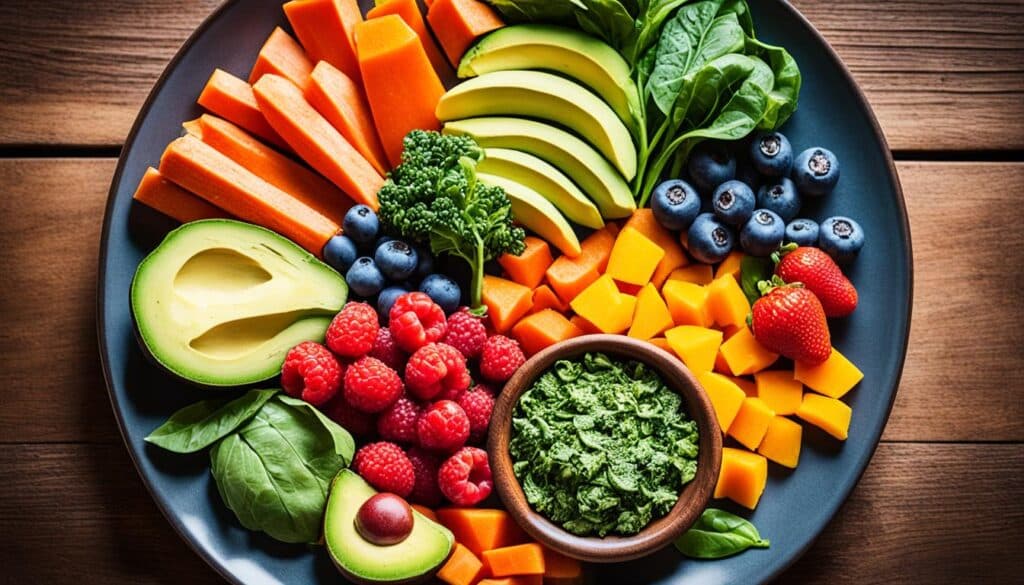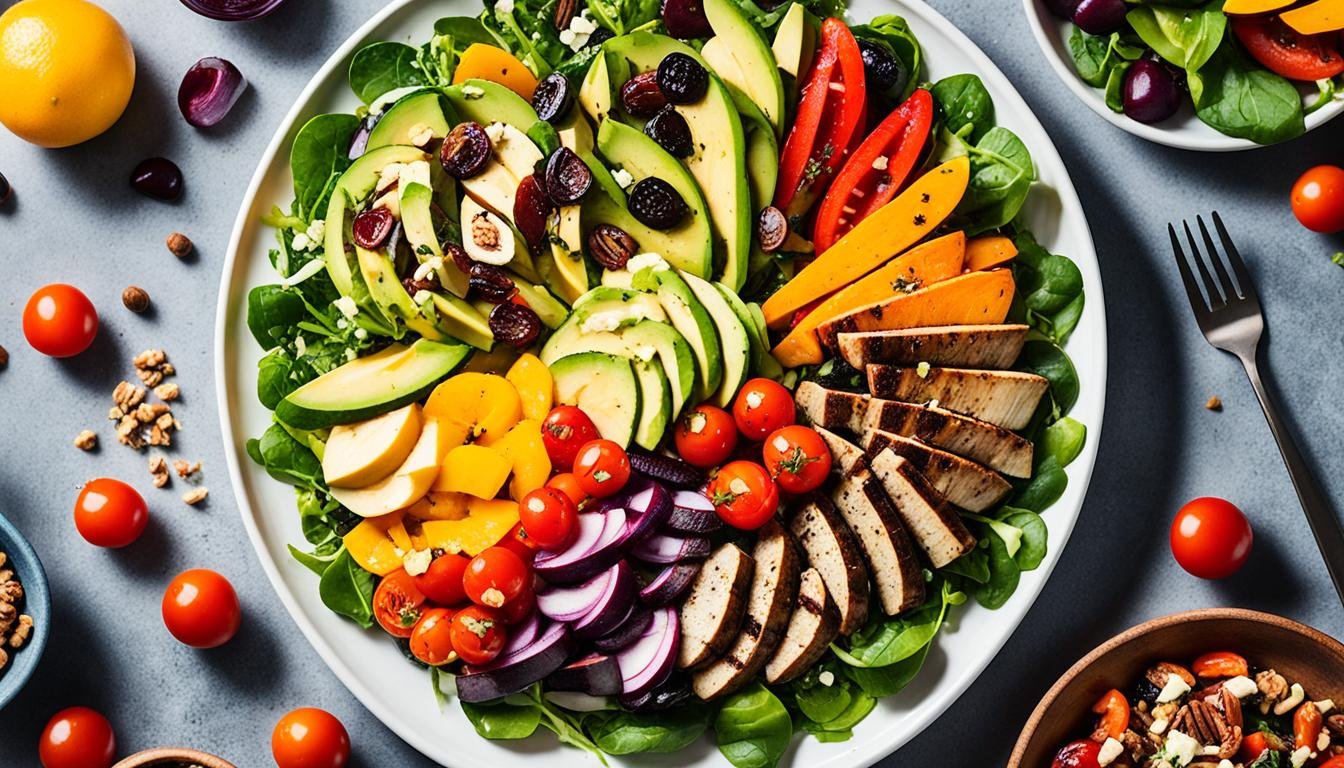Start your journey to plant-based eating with this simple 30-day plant-based diet plan. Perfect for beginners and those looking for a structured meal plan to follow, this plan features delicious recipes that require minimal prep and make use of ingredients to reduce food waste. By adopting a plant-based diet, you can improve your heart health, enhance your mood, and reduce the risk of chronic diseases. What’s more, embracing plant-based eating can also save you money at the grocery store.
Key Takeaways : 30-Day Plan
- Embark on a 30-day plant-based diet plan to kickstart a healthier lifestyle.
- Enjoy simple recipes with minimal prep, designed to reduce food waste.
- Experience improved heart health, mood, and reduced risk of chronic diseases.
- Save money at the grocery store by embracing plant-based eating.
- Start your plant-based journey today and reap the benefits of a healthier lifestyle.
What is a Plant-Based Diet?
A plant-based diet is a way of eating that emphasizes the consumption of foods derived from plants as the primary source of nutrients. This dietary approach includes various eating patterns such as veganism, vegetarianism, pescatarianism, and flexitarianism.
The foundation of a plant-based diet is centered around plant foods, including fruits, vegetables, grains, herbs, legumes, nuts, and seeds. These foods provide a rich source of essential macronutrients such as protein, fat, and carbohydrates, obtained from plant sources.
Whether someone follows a vegan, vegetarian, pescatarian, or flexitarian dietary pattern, the common thread is the inclusion of plant-based foods as the mainstay of their meals. This can be a personalized approach based on individual preferences and dietary restrictions.
A plant-based diet offers a wide range of health benefits, including improved overall health, reduced risk of chronic diseases, and increased intake of essential vitamins, minerals, and antioxidants found in fruits and vegetables.
Foods Included in a Plant-Based Diet Plan
A balanced plant-based diet consists of a variety of minimally processed, whole-plant foods that provide the essential nutrients your body needs. Incorporating these foods into your meals will help ensure a nourishing and satisfying plant-based eating experience.
Brown Rice
**Brown rice** is a versatile whole grain that serves as a nutritious foundation for many plant-based dishes. It is rich in dietary fiber, which aids digestion and helps keep you feeling full longer.
Tofu
**Tofu** is a plant-based protein that can be marinated and cooked in various ways, making it a versatile ingredient for plant-based meals. It provides essential amino acids and adds a satisfying texture to dishes.
Black Beans
**Black beans** are a nutritional powerhouse when it comes to plant-based eating. They are a great source of protein and dietary fiber, which promotes healthy digestion and supports overall gut health. Black beans are also rich in folate and magnesium.
Sweet Potatoes
**Sweet potatoes** are a nutritious alternative to white potatoes and are packed with essential nutrients. They are high in beta-carotene, a precursor to vitamin A, which supports vision health and immune function.
Almond Milk
**Almond milk** is a popular plant-based dairy alternative that can be used in place of traditional cow’s milk. It is a rich source of calcium, vitamin E, and healthy fats.
By incorporating these **whole-plant foods** into your plant-based diet, you can ensure that you are getting a balanced and nourishing array of nutrients. Remember to choose minimally processed options to optimize the nutritional value of your meals.

How Does This Diet Plan Work?
The 30-day plant-based diet plan is designed to provide individuals with a flexible framework for adopting a plant-based lifestyle. It allows for customization based on personal goals, food restrictions, and preferences. By following this plan, you can embark on a holistic journey towards improving your health and well-being.
Setting Clear Goals
Before starting the 30-day plant-based diet plan, it’s important to set clear goals. Determine what you hope to achieve during this period, whether it’s weight loss, increased energy, or improved overall health. Having well-defined goals will help you stay motivated and focused throughout the plan.
Considering Food Restrictions
Take into account any food restrictions or allergies you may have before creating your personalized meal plan. This ensures that you choose plant-based foods that meet your dietary needs and preferences. Whether you’re avoiding gluten, soy, or any other specific ingredient, tailor your choices accordingly to make the most of your plant-based diet.
Selecting a Start Date
Pick a start date that works best for you. This allows you to mentally and physically prepare for the transition to a plant-based diet. Having a specific start date creates a sense of commitment and helps you stay accountable to your goals throughout the 30-day period.
Filling in the Meals
Using the provided template, fill in breakfast, lunch, dinner, and snack options for each of the 30 days. Prioritize including a variety of plant-based foods such as fruits, vegetables, whole grains, legumes, nuts, and seeds. Experiment with different recipes and flavors to keep your meals exciting and enjoyable.
Reflecting on the Experience
At the end of the 30 days, take the time to reflect on your experience with the plant-based diet plan. Consider how your body feels, any changes in energy levels or overall well-being, and evaluate whether the plan met your goals. Reflecting on your journey can help you make informed decisions about continuing with a plant-based lifestyle or making further adjustments to your diet.
“The 30-day plant-based diet plan provides a flexible framework for individuals looking to adopt a plant-based lifestyle while considering their unique goals and food restrictions. By customizing the plan and setting clear goals, individuals can create a personal roadmap towards a healthier and more sustainable way of eating.” – [Author Name]

Benefits of Customization
Customizing the 30-day plant-based diet plan allows individuals to tailor their meals to their specific needs and preferences. By doing so, several benefits can be experienced:
- Improved satisfaction: Personalizing the meal plan ensures that you enjoy the foods you eat, making it more sustainable in the long run.
- Enhanced adherence: By aligning the plan with your dietary restrictions and goals, you are more likely to stick with it for the full 30 days.
- Increased variety: Customization allows for a wider range of flavors, textures, and nutrients in your meals, keeping you engaged and excited throughout the plan.
- Addressing specific needs: Whether you have dietary sensitivities or nutrient deficiencies, tailoring the plan can help address these issues and promote optimal health.
Benefits of Following a Plant-Based Diet
There are numerous benefits to embracing a plant-based diet. By reducing meat intake, individuals can significantly lower their risk of heart disease, obesity, and certain types of cancer. Incorporating more fruits, vegetables, legumes, and whole grains into your daily meals not only increases dietary fiber intake, which aids digestion and promotes gut health, but also ensures a rich supply of essential vitamins, minerals, and antioxidants.
One of the key advantages of a plant-based diet is the opportunity to increase plant protein intake. By substituting animal-based protein sources with plant-based alternatives such as tofu, legumes, and nuts, you can promote muscle development and reduce the risk of cardiovascular diseases. Plant proteins are often low in saturated fat and cholesterol, making them a healthier choice for maintaining overall well-being.
Furthermore, opting for a plant-based diet can actively contribute to reducing your environmental impact. The production of meat, especially from cattle, is associated with significant greenhouse gas emissions and can strain natural resources. By choosing to eat more plant-based meals, you support a more sustainable food system and contribute to efforts aimed at reducing global carbon footprints.
To summarize, embracing a plant-based diet offers a multitude of benefits for both personal health and the environment. By reducing meat consumption, increasing dietary fiber intake, and choosing plant protein sources, you can improve your overall well-being, while simultaneously reducing your ecological footprint.
Join the movement today and discover the positive impact of a plant-based lifestyle on your health and the world around you.
Join the movement
“The greatest threat to our planet is the belief that someone else will save it.” – Robert Swan
| Benefits of Following a Plant-Based Diet | Keywords |
|---|---|
| Reduced risk of heart disease, obesity, and certain cancers | reduce meat intake |
| Improved digestion and gut health | dietary fiber intake |
| Promotes muscle development and reduces the risk of cardiovascular diseases | increase plant protein intake |
| Provides essential vitamins, minerals, and antioxidants | eat more fruits and vegetables |
| Reduces greenhouse gas emissions and promotes sustainability | reduce environmental impact |

By adopting a plant-based diet, you can reduce meat intake, increase your dietary fiber intake, and boost your consumption of fruits, vegetables, legumes, and whole grains. This dietary shift not only benefits your health by reducing the risk of heart disease, obesity, and certain cancers but also contributes to a more sustainable future by lowering greenhouse gas emissions and promoting environmental conservation.
30-Day Plant-Based Meal Plan
Embarking on a 30-day plant-based journey? We’ve got you covered with a sample meal plan that includes delicious recipes for every meal of the day. Whether you’re craving a hearty breakfast, a satisfying lunch, a guilt-free snack, a flavorful dinner, or a delectable dessert, this meal plan has it all.
Our 30-day plant-based meal plan is carefully designed to provide a balanced and nutritious diet that will keep you feeling energized and satisfied throughout the day. Each recipe is thoughtfully crafted to incorporate a variety of flavors and textures, ensuring you never get bored with your meals.
We understand that making the switch to a plant-based diet can be challenging, especially if you’re used to eating a lot of animal products. That’s why our meal plan includes a combination of fresh ingredients and nutrient-dense prepared foods, making the transition easier and more enjoyable.
“Eating plant-based doesn’t have to be boring or restrictive. Our 30-day meal plan is designed to show you just how diverse and delicious plant-based eating can be. From mouthwatering breakfast bowls to hearty lunch salads, and from comforting dinners to decadent desserts, we’ve got your taste buds covered.”
Here’s a sneak peek at some of the sample recipes included in our 30-day plant-based meal plan:
Breakfast:
- Blueberry Chia Pudding
- Avocado Toast with Roasted Tomatoes
- Green Smoothie Bowl
Lunch:
- Quinoa Salad with Roasted Vegetables
- Mediterranean Chickpea Wrap
- Asian-inspired Veggie Stir-Fry
Snack:
- Spicy Roasted Chickpeas
- Homemade Energy Balls
- Crunchy Kale Chips
Dinner:
- Stuffed Bell Peppers with Quinoa and Black Beans
- Butternut Squash Curry with Brown Rice
- Lentil Bolognese over Zucchini Noodles
Dessert:
- Chocolate Avocado Mousse
- Berry Crumble with Oat Topping
- Coconut Milk Ice Cream with Fresh Fruit
These are just a few examples of the mouthwatering recipes you’ll find in our 30-day plant-based meal plan. Each recipe is accompanied by detailed instructions and nutritional information, ensuring you have all the tools you need to prepare delicious plant-based meals.
To access the full 30-day plant-based meal plan, including all the sample recipes and additional details, download our comprehensive guide now!
Oprah’s Journey to a Plant-Based Diet
Oprah Winfrey, a prominent figure known for her influential media career, embarked on a 30-day challenge to try a plant-based diet. Intrigued by the potential health benefits, she made a personal commitment to incorporate at least one plant-based meal into her daily routine. To ensure a successful transition, Oprah enlisted the expertise of renowned chef Raymond to develop a comprehensive meal plan that would cater to her preferences and nutritional needs.
With Raymond’s guidance, Oprah’s meal plan features a diverse range of plant-based recipes that are both delicious and satisfying. Each recipe has been carefully selected and approved by Oprah herself, ensuring that every meal is not only nutritious but also enjoyable. Oprah is passionate about sharing her journey with her audience and encourages them to try plant-based meals as well.
Throughout her challenge, Oprah documents her experiences and showcases the positive impact of incorporating plant-based foods into her diet. She recognizes that the journey to plant-based eating is an individual one, and her story serves as an inspiration for others who wish to explore this path to better health.
As Oprah continues her plant-based journey, she remains an advocate for the benefits of incorporating more plant-based meals into one’s diet. Through her influential platform, she showcases the accessibility and variety of plant-based recipes, making it easier for others to embrace this lifestyle.

Plant-Based Recipes
Here are a few plant-based recipes that Oprah has shared with her audience:
- Quinoa and Vegetable Stir-Fry
- Chickpea Curry with Coconut Rice
- Roasted Vegetable and Hummus Wrap
- Black Bean and Sweet Potato Chili
- Avocado and Tomato Salad with Balsamic Dressing
These recipes not only provide a delicious and satisfying dining experience but also showcase the versatility and flavor of plant-based ingredients.
Enlist a Meal Plan:
“Trying a plant-based diet can be challenging initially, but with the right meal plan, it becomes much easier. Having a roadmap of recipes and meals to follow ensures that you stay on track and can make the most of the experience.” – Oprah Winfrey
If you’re interested in embarking on your own plant-based journey, creating a meal plan can be a helpful step in the right direction. It provides structure and guidance, making the transition to plant-based eating more manageable.
| Benefits of a Meal Plan | How a Meal Plan Can Help |
|---|---|
| 1. Ensures variety in meals | 1. Avoids monotony by introducing diverse recipes |
| 2. Simplifies grocery shopping | 2. Helps to create a well-rounded shopping list |
| 3. Aids in managing food budget | 3. Reduces impulse purchases and unnecessary expenses |
| 4. Provides structure and consistency | 4. Establishes a routine and promotes adherence to the plan |
By following a meal plan, you can experience the benefits of plant-based eating while enjoying a variety of tasty and nutritious meals.
The Importance of a Plant-Based Diet
A plant-based diet is not only beneficial for personal health but also crucial for the environment and animal welfare. By adopting a plant-based lifestyle, individuals can contribute to positive changes in multiple areas of life.
Health Benefits: Numerous studies have shown that a plant-based diet is associated with a reduced risk of chronic diseases such as heart disease, diabetes, and certain types of cancer. Plant-based foods are rich in essential nutrients, vitamins, minerals, and antioxidants, which promote overall well-being and support a healthy immune system.
Environmental Impact: Choosing plant-based foods can significantly reduce carbon footprints and lower greenhouse gas emissions. Animal agriculture is a major contributor to climate change, deforestation, and water pollution. By consuming plant-based foods, we can help conserve natural resources and mitigate the environmental impact of food production.
Animal Welfare: Opting for a plant-based diet reduces the demand for animal products, which in turn contributes to animal welfare. Industrial animal farming often involves cruel practices and harsh living conditions for livestock. By reducing our consumption of animal products, we can promote ethical treatment of animals and support more sustainable farming practices.
Sustainability: Plant-based eating is a sustainable approach to nourishing our bodies and the planet. It ensures the availability of resources for future generations and helps create a more balanced and resilient ecosystem. By embracing a plant-based diet, we can contribute to a more sustainable and harmonious world.
| Benefits of a Plant-Based Diet |
|---|
| Improved heart health |
| Reduced risk of chronic diseases |
| Supports healthy immune system |
| Lower carbon footprint |
| Reduces greenhouse gas emissions |
| Promotes animal welfare |
| Conserves natural resources |
| Supports sustainable farming practices |
| Contributes to a more balanced ecosystem |
By adopting a plant-based diet, we can enjoy the health benefits it offers while making a positive impact on the environment and animal welfare. It is a win-win situation where personal well-being aligns with global sustainability goals.
Create a delicious and nutritious plant-based meal plan with these vegan recipes and plant-based foods. Incorporate ingredients tsp like olive oil, chickpeas, avocado, quinoa, and tofu into your plant-based eating routine to enjoy a variety of flavors and textures. Whisk together olive oil, lemon juice, and tahini for a flavorful dressing to drizzle over your kale and lentil salad.
For a satisfying main course, toss black beans, thank you so much brown rice, and diced sweet potato in a saucepan with diced onion and garlic, then serve in a warm tortilla with a dollop of hummus and a sprinkle of cilantro. Don’t forget to snack on almond butter vegan diet spread over slices of banana or enjoy a handful of blueberries for a sweet treat. With these plant-based meal ideas, you can nourish mediterranean diet your body while supporting heart health and reducing your consumption of animal products.
Embark on your plant-based journey with a 30-day plant-based diet plan for beginners to boost your health and support your well-being. This healthy meal plan provides a variety of fresh foods and whole food plant-based options to nourish your body and meet your dietary needs. From plant-based milk to sources of protein like chickpeas and tofu, you’ll be surprised by the delicious foods you can eat while following a plant-based diet. Cook until tender and bake for 25 minutes, following the easy-to-follow recipes provided in your 30-day plant-based meal plan.
Heat olive oil in a saucepan and cook for an additional 3 minutes, then whisk together coconut milk for added flavor without added sugar. Take the guesswork out of grocery shopping with a comprehensive list of foods you can enjoy, while avoiding rigid diet restrictions. Whether you’re looking to start your plant-based journey or simply seeking a more flexible way of eating, this 30-day plant-based eating plan is the perfect way to begin.
Follow a healthy meal plan to boost your health and vitality, embracing the benefits of a plant-based eating plan. By following a plant-based diet, even for just one meal a day, you can nourish your body with whole food plant-based options that support overall well-being. plant based diet Enjoy plant-based milk and a variety of foods you can eat while avoiding restrictive dieting practices.
day plant based diet Embracing a plant-based diet doesn’t mean adhering to a rigid diet; rather, it offers a flexible way of eating that prioritizes whole, nourishing foods. Whether you’re following a plant-based eating plan for one meal or incorporating it into your day-to-day routine, the abundance of foods available on a plant-based diet could enhance your overall health and vitality.
Incorporating a plant-based diet into your day-to-day eating habits could significantly impact your overall health and well-being. Opting for a whole food plant-based diet means prioritizing nutrient-rich foods that come directly from plants, such as fruits, vegetables, whole grains, nuts, and seeds. Plant-based milk, derived from sources like almonds, soy, or oats, offers a dairy-free alternative packed with essential vitamins and minerals.
By following a plant-based eating plan, you can enjoy a diverse array of foods while reaping the health benefits associated with a diet rich in plant-based goodness. Whether diet eating you’re exploring the benefits of plant-based eating for one meal a day or fully embracing a whole food plant-based lifestyle, the variety of foods available ensures that you have ample options to support your dietary preferences and health goals.
diet is one Take the guesswork out of cooking with our simple and delicious plant-based recipes, perfect for anyone looking to start their journey towards a healthier lifestyle. Start by heating extra-virgin olive oil in a pan, then add coconut milk and cook for 3 minutes, stirring every 5 minutes for optimal flavor. These recipes are packed with sources of protein, ensuring you get the nutrients you need without added sugar. Whether you’re a seasoned cook or new to plant-based eating, our recipes provide a whole food plant based convenient and nutritious way to enjoy meals that support your health and well-being.
Embark on a 30-day plant-based diet journey with our comprehensive plant-based plan. Whether you’re new to eating a plant-based diet or have been following day plant-based one for some time, our plan means you’ll enjoy delicious, whole food plant-based meals every day. From breakfast to dinner, our recipes are designed to make plant-based eating easy and satisfying. Simply cook for 2 minutes to prepare nutritious meals that support your health and well-being while aligning with your dietary preferences.
Also Read : 7 Ways To Stay Young And Healthy
Conclusion
In conclusion, the 30-day plant-based diet plan provides a fantastic opportunity to embark on a journey of healthy eating. This plan offers numerous benefits for personal health, the environment, and animal welfare. By incorporating a diverse range of whole plant-based foods into your meals, you can enjoy delicious and nutritious options throughout the day.
Whether you are a beginner or already familiar with plant-based eating, this meal plan serves as an excellent framework for integrating more plant-based foods into your diet. It provides a variety of recipes and meal ideas that cater to different tastes and preferences.
With the 30-day plant-based diet plan, you can experience improved well-being, reduce your ecological footprint, and contribute to animal welfare. So why not start your plant-based journey today and discover the many benefits of this sustainable and compassionate way of eating?
FAQs
Q: What is a 30-day plant-based diet plan?
A: A 30-day plant-based diet plan entails following a diet that consists primarily of whole foods derived from plants such as fruits, vegetables, nuts, seeds, grains, and legumes for a duration of 30 days.
Q: How can a beginner start a plant-based diet meal plan?
A: Beginners can start a plant-based diet meal plan by gradually incorporating more fruits, vegetables, whole grains, legumes, nuts, and seeds into their meals while reducing or eliminating animal products.
Q: What foods are included in a plant-based diet?
A: Foods included in a plant-based diet are items like olive oil, cilantro, bananas, carrots, tortillas, yogurt, pita bread, lime juice, cucumbers, black pepper, sesame seeds, walnuts, and tahini, among others.
Q: What should you avoid on a plant-based diet?
A: On a plant-based diet, it is advisable to avoid consuming foods such as red meat, dairy products like cheese and milk, and processed foods high in refined sugars, unhealthy fats, and artificial ingredients.
Q: How can following a plant-based eating plan boost your health?
A: Following a plant-based eating plan can boost your health by providing a variety of essential nutrients, antioxidants, fiber, and plant compounds that have been linked to numerous health benefits including weight management, improved heart health, and reduced risk of chronic diseases.
Q: What constitutes a whole food plant-based diet?
A: A whole food plant-based diet consists of consuming whole, minimally processed foods that are derived from plants and excluding or minimizing the intake of animal products, refined sugars, and processed foods.
Q: What should be included in a grocery list for a plant-based diet plan?
A: A grocery list for a plant-based diet plan should include a variety of fruits, vegetables, whole grains, legumes, nuts, seeds, plant-based milk, herbs, spices, and other plant-based ingredients to support a healthy and balanced diet.
